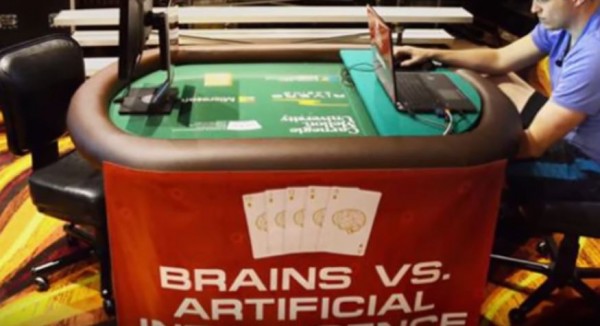By Krisana Estaura, | April 12, 2017

The poker bot, run by an artificial intelligence (AI) program, took home $290,000 in a landslide victory against a human team called 'Team Dragon.' (YouTube)
Carnegie Mellon University's latest poker bot, Lengpudashi, crushed another team of six poker professionals during a five-day tournament in China.
The poker bot, run by an artificial intelligence (AI) program, took home $290,000 in a landslide victory against a human team called 'Team Dragon.'
Like Us on Facebook
The human team was led by Yue Du, who bagged the World Series of Poker $5,000 buy-in, no-limit, Texas Hold'em category last year. It consisted of computer scientists, engineers, and investors.
Poker Sites reported that Du sought individuals with knowledge of machine intelligence and game theory instead of looking for accomplished poker pros. The strategy, however, proved ineffective in anticipating and countering Lengpudashi's play.
This is the second time that an AI has put human players to shame. The first one was called Libratus who beat four of the world's best poker players during a 20-day tournament in January.
Both AI poker players were created by Tuomas Sandholm, a computer science professor at Carnegie Mellon University and Ph.D. student Noam Brown. The duo founded a company called the Strategic Machine which will take the prize money.
"Imperfect Information"
The BBC reported that poker is often described by computer scientists as an "imperfect information game" where there are a lot of factors competing agents need to understand to improve performance. It is different from chess and Go where all the playable pieces are visible on the board.
With poker, players rely on complicated betting strategies and their abilities to bluff or spot when opponents are bluffing
"The best AI's ability to do strategic reasoning with imperfect information has now surpassed that of the best humans," Sandholm told Central Michigan University News. "A computer can learn from experience that if it has a weak hand and it bluffs, it can make more money."
-
Use of Coronavirus Pandemic Drones Raises Privacy Concerns: Drones Spread Fear, Local Officials Say

-
Coronavirus Hampers The Delivery Of Lockheed Martin F-35 Stealth Fighters For 2020

-
Instagram Speeds Up Plans to Add Account Memorialization Feature Due to COVID-19 Deaths

-
NASA: Perseverance Plans to Bring 'Mars Rock' to Earth in 2031

-
600 Dead And 3,000 In The Hospital as Iranians Believed Drinking High-Concentrations of Alcohol Can Cure The Coronavirus

-
600 Dead And 3,000 In The Hospital as Iranians Believed Drinking High-Concentrations of Alcohol Can Cure The Coronavirus

-
COVID-19: Doctors, Nurses Use Virtual Reality to Learn New Skills in Treating Coronavirus Patients







